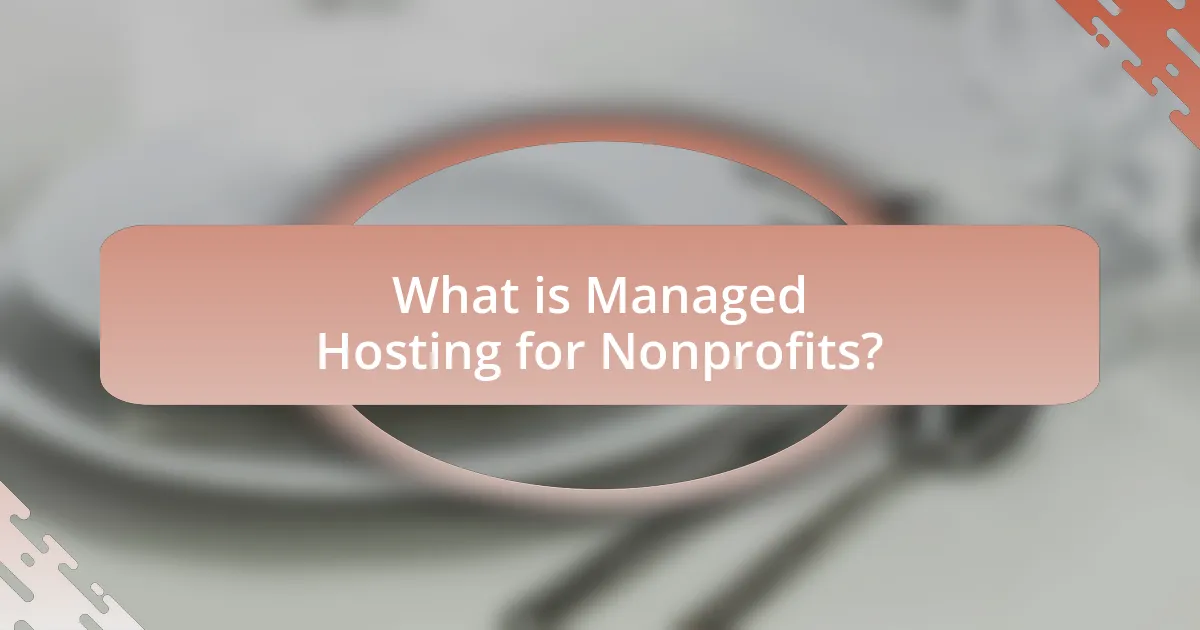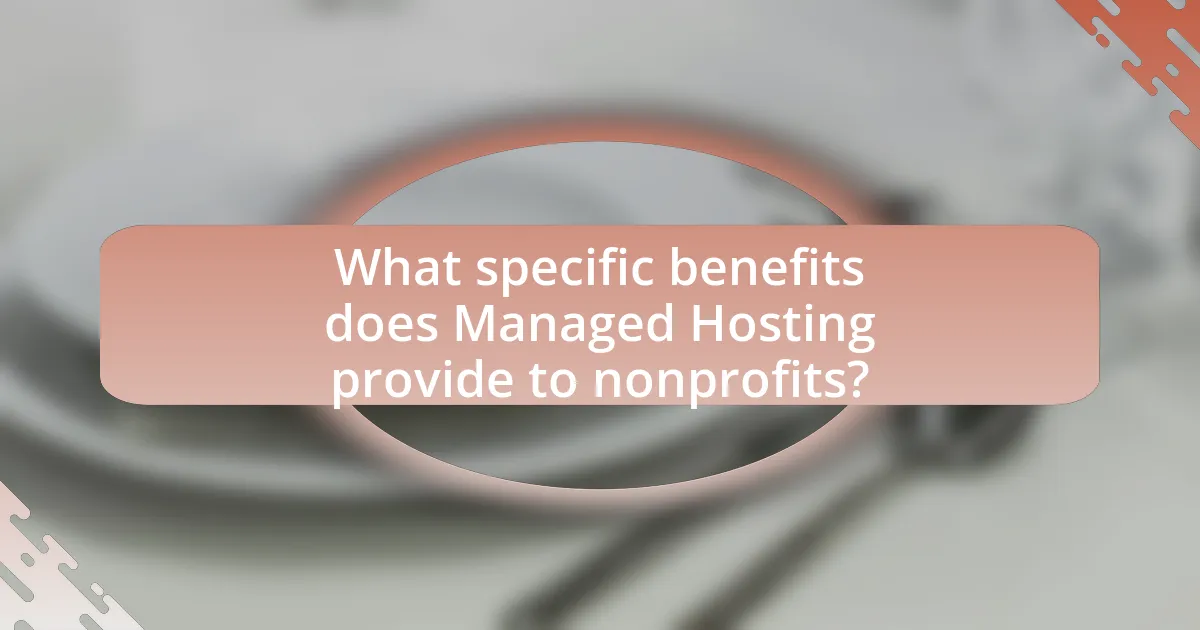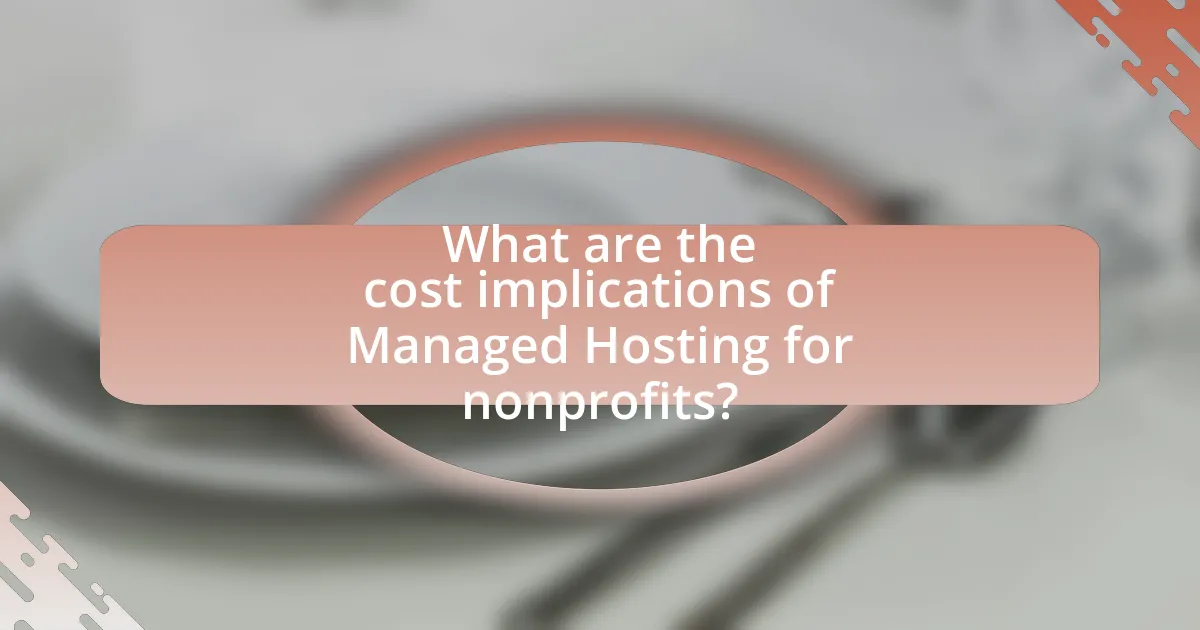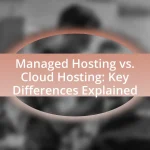Managed hosting for nonprofits is a specialized service that provides dedicated server resources and management, allowing organizations to focus on their mission while the provider handles technical aspects such as maintenance, security, and support. This article outlines the differences between managed and traditional hosting, highlighting the advantages of enhanced security, improved performance, and cost-effectiveness that managed hosting offers to nonprofits. It also discusses the specific services included, the support structure, and the impact of website speed and uptime on donor engagement. Additionally, the article addresses potential challenges nonprofits may face when transitioning to managed hosting and offers best practices for selecting a suitable provider.

What is Managed Hosting for Nonprofits?
Managed hosting for nonprofits is a service that provides dedicated server resources and management tailored specifically for nonprofit organizations. This type of hosting allows nonprofits to focus on their mission while a managed hosting provider handles server maintenance, security, and technical support. According to a report by TechSoup, managed hosting can enhance operational efficiency and reduce IT costs for nonprofits, enabling them to allocate more resources toward their programs and services.
How does Managed Hosting differ from traditional hosting?
Managed hosting provides a higher level of service compared to traditional hosting by offering dedicated resources, proactive management, and enhanced security. In managed hosting, the service provider takes care of server maintenance, updates, and monitoring, allowing organizations to focus on their core activities. Traditional hosting typically requires users to manage their own servers, which can lead to increased downtime and security vulnerabilities. According to a study by HostingAdvice, 70% of businesses reported improved performance and security with managed hosting solutions, highlighting the advantages of this approach over traditional hosting.
What services are typically included in Managed Hosting for nonprofits?
Managed Hosting for nonprofits typically includes services such as server management, security monitoring, data backups, technical support, and performance optimization. These services ensure that nonprofits can focus on their mission without worrying about the complexities of IT infrastructure. For instance, server management involves the configuration and maintenance of servers, while security monitoring protects sensitive data from cyber threats. Data backups are crucial for disaster recovery, ensuring that important information is not lost. Technical support provides assistance with any issues that may arise, and performance optimization enhances website speed and reliability, which is vital for user engagement and outreach efforts.
How does the support structure work in Managed Hosting?
In Managed Hosting, the support structure typically consists of a dedicated team of IT professionals who provide 24/7 monitoring, maintenance, and troubleshooting for hosted services. This team is responsible for ensuring optimal performance, security, and uptime of the hosted environment, allowing organizations to focus on their core missions without worrying about technical issues. Managed Hosting providers often include features such as proactive system updates, backup solutions, and direct access to technical support, which enhances the overall reliability and efficiency of the hosting service. This structured support is particularly beneficial for nonprofits, as it allows them to allocate resources more effectively while ensuring their online presence remains stable and secure.
Why should nonprofits consider Managed Hosting?
Nonprofits should consider Managed Hosting because it provides specialized support and resources tailored to their unique needs. Managed Hosting offers enhanced security, ensuring that sensitive donor and client data is protected, which is crucial for maintaining trust and compliance with regulations. Additionally, it allows nonprofits to focus on their mission rather than IT management, as service providers handle server maintenance, updates, and technical issues. This can lead to improved website performance and uptime, which is vital for engaging with donors and beneficiaries effectively. According to a study by TechSoup, 70% of nonprofits reported that using managed services improved their operational efficiency, demonstrating the tangible benefits of this approach.
What are the key advantages of Managed Hosting for nonprofit organizations?
Managed hosting offers nonprofit organizations several key advantages, including enhanced security, cost-effectiveness, and improved performance. Enhanced security is crucial for nonprofits that handle sensitive donor information; managed hosting providers typically implement robust security measures, including firewalls and regular security updates, to protect against data breaches. Cost-effectiveness is another significant advantage, as managed hosting allows nonprofits to reduce IT overhead by outsourcing server management, which can lead to lower operational costs. Additionally, improved performance is achieved through optimized server configurations and dedicated resources, ensuring that nonprofit websites run smoothly and efficiently, which is vital for user engagement and fundraising efforts. These advantages collectively empower nonprofits to focus on their mission rather than IT challenges.
How does Managed Hosting enhance operational efficiency for nonprofits?
Managed Hosting enhances operational efficiency for nonprofits by providing dedicated resources and expert support, allowing organizations to focus on their mission rather than IT management. This service includes automatic updates, security monitoring, and performance optimization, which reduce downtime and improve website reliability. According to a study by TechSoup, nonprofits that utilize managed hosting experience a 30% increase in operational productivity due to reduced IT burdens and enhanced system performance. This efficiency enables nonprofits to allocate more time and resources to their core activities, ultimately leading to greater impact in their communities.

What specific benefits does Managed Hosting provide to nonprofits?
Managed Hosting provides nonprofits with enhanced security, improved performance, and cost efficiency. Nonprofits benefit from robust security measures, including firewalls and regular backups, which protect sensitive donor and operational data. Additionally, Managed Hosting optimizes website performance through dedicated resources and expert management, ensuring that nonprofit websites run smoothly and efficiently. This service also reduces IT costs by eliminating the need for in-house server management and maintenance, allowing nonprofits to allocate more resources toward their missions. According to a study by TechSoup, 70% of nonprofits reported that using managed services improved their operational efficiency, highlighting the tangible advantages of this hosting solution.
How does Managed Hosting improve website performance for nonprofits?
Managed hosting significantly improves website performance for nonprofits by providing dedicated resources, optimized server configurations, and expert support. This type of hosting ensures that nonprofits experience faster load times and reduced downtime, which are critical for user engagement and retention. For instance, a study by Google found that a one-second delay in page load time can lead to a 20% decrease in conversions. Additionally, managed hosting services often include Content Delivery Networks (CDNs) that distribute content globally, further enhancing speed and reliability. By leveraging these resources, nonprofits can focus on their mission while ensuring their websites operate efficiently and effectively.
What impact does website speed have on donor engagement?
Website speed significantly impacts donor engagement by influencing user experience and conversion rates. Research indicates that a one-second delay in page load time can lead to a 7% reduction in conversions, which directly affects the likelihood of donations. Additionally, studies show that 53% of mobile users abandon sites that take longer than three seconds to load, highlighting the critical nature of speed in retaining potential donors. Faster websites enhance user satisfaction, leading to increased trust and higher engagement levels, ultimately resulting in more donations for nonprofits.
How does uptime reliability affect nonprofit operations?
Uptime reliability significantly impacts nonprofit operations by ensuring that essential services and communications remain accessible to stakeholders. Nonprofits rely on their websites and online platforms to engage with donors, volunteers, and beneficiaries; therefore, consistent uptime minimizes disruptions that could hinder fundraising efforts or service delivery. For instance, a study by the Nonprofit Technology Network found that organizations with high uptime experience 30% more engagement from their online audiences, directly correlating uptime with operational effectiveness. This reliability fosters trust and credibility, which are crucial for maintaining donor relationships and community support.
In what ways does Managed Hosting enhance security for nonprofits?
Managed Hosting enhances security for nonprofits by providing dedicated resources, expert management, and advanced security protocols. Nonprofits benefit from a secure environment that includes firewalls, intrusion detection systems, and regular security updates, which are essential for protecting sensitive donor and client information. Additionally, managed hosting services often include data encryption and compliance with regulations such as GDPR and HIPAA, ensuring that nonprofits meet legal requirements for data protection. The use of dedicated servers minimizes the risk of data breaches that can occur in shared hosting environments, further safeguarding nonprofit operations.
What security features are essential for nonprofit websites?
Essential security features for nonprofit websites include SSL certificates, regular software updates, secure payment processing, data encryption, and robust user authentication. SSL certificates protect sensitive information during transmission, while regular software updates ensure that vulnerabilities are patched. Secure payment processing is crucial for safeguarding donor information, and data encryption protects stored data from unauthorized access. Robust user authentication, such as two-factor authentication, adds an extra layer of security against unauthorized access. These features collectively help maintain the integrity and trustworthiness of nonprofit websites, which is vital for donor confidence and compliance with data protection regulations.
How can Managed Hosting protect against data breaches?
Managed Hosting can protect against data breaches by implementing robust security measures such as firewalls, intrusion detection systems, and regular security audits. These measures create a multi-layered defense that significantly reduces vulnerabilities. For instance, according to a report by IBM, organizations that employ managed hosting services experience 50% fewer data breaches compared to those that do not utilize such services. Additionally, managed hosting providers often offer compliance with industry standards like GDPR and HIPAA, ensuring that sensitive data is handled securely. This adherence to regulations further mitigates the risk of breaches, providing nonprofits with a safer environment for their data.

What are the cost implications of Managed Hosting for nonprofits?
Managed hosting for nonprofits typically incurs higher upfront costs compared to shared hosting, but it offers significant long-term savings and benefits. Nonprofits can expect to pay between $100 to $500 per month for managed hosting services, depending on the provider and the level of service required. This investment often leads to reduced IT overhead, as managed hosting includes maintenance, security, and support, which can save nonprofits from hiring additional staff or outsourcing these tasks. Furthermore, managed hosting providers often offer scalable solutions, allowing nonprofits to adjust their resources based on their needs, which can lead to cost efficiency over time.
How does Managed Hosting compare in cost to traditional hosting solutions?
Managed hosting typically incurs higher costs compared to traditional hosting solutions. This is primarily due to the comprehensive services included in managed hosting, such as server management, security, and technical support, which are often not provided in traditional hosting. For instance, while traditional hosting may cost as little as $5 to $10 per month, managed hosting can range from $30 to over $500 per month, depending on the level of service and resources required. The added expense reflects the value of reduced administrative burdens and enhanced performance, which can be particularly beneficial for nonprofits that may lack in-house IT expertise.
What factors influence the pricing of Managed Hosting services?
The pricing of Managed Hosting services is influenced by several key factors, including the level of support provided, server specifications, scalability options, and additional features such as security and backups. The level of support, which can range from basic to 24/7 expert assistance, directly impacts costs; for instance, services offering round-the-clock support typically charge more. Server specifications, including CPU power, RAM, and storage capacity, also play a crucial role, as higher specifications lead to increased pricing. Scalability options, which allow organizations to adjust resources based on demand, can further affect pricing structures. Additionally, features like enhanced security measures and automated backups contribute to overall costs, as these services require more resources and management.
How can nonprofits budget for Managed Hosting effectively?
Nonprofits can budget for Managed Hosting effectively by conducting a thorough assessment of their specific needs and aligning them with the pricing structures of various hosting providers. This involves evaluating factors such as website traffic, storage requirements, and necessary support services to determine the most suitable hosting plan. For instance, a study by TechSoup indicates that nonprofits often save up to 30% on IT costs by choosing managed services tailored to their operational scale. By comparing multiple providers and considering long-term contracts for potential discounts, nonprofits can optimize their budget while ensuring reliable hosting solutions.
What are the potential challenges nonprofits may face with Managed Hosting?
Nonprofits may face several potential challenges with Managed Hosting, including cost, vendor lock-in, and limited control over infrastructure. The cost of managed hosting services can be significant, which may strain the budgets of nonprofits that often operate with limited financial resources. Additionally, vendor lock-in can occur when nonprofits become dependent on a specific provider’s services and tools, making it difficult to switch providers or migrate data without incurring substantial costs or downtime. Furthermore, nonprofits may experience limited control over their hosting environment, which can restrict their ability to customize solutions to meet specific needs or respond quickly to changing requirements. These challenges highlight the importance of careful consideration and planning when selecting managed hosting services.
What common misconceptions exist about Managed Hosting for nonprofits?
Common misconceptions about Managed Hosting for nonprofits include the belief that it is too expensive, that it lacks customization options, and that it is only suitable for large organizations. Many nonprofits assume that managed hosting services are beyond their budget, but in reality, they can often save costs through improved efficiency and reduced downtime. Additionally, some organizations think that managed hosting offers limited flexibility; however, many providers offer tailored solutions that meet specific needs. Lastly, the notion that only large nonprofits can benefit from managed hosting is incorrect, as smaller organizations can also leverage these services to enhance their online presence and operational capabilities.
How can nonprofits overcome obstacles when transitioning to Managed Hosting?
Nonprofits can overcome obstacles when transitioning to Managed Hosting by conducting thorough planning and engaging with experienced providers. Effective planning involves assessing current infrastructure, identifying specific needs, and setting clear goals for the transition. Engaging with experienced Managed Hosting providers ensures access to expertise and support, which can mitigate risks associated with the transition. For instance, a study by TechSoup found that nonprofits that utilized professional services during their IT transitions reported a 30% reduction in downtime and improved operational efficiency. This evidence highlights the importance of strategic planning and expert collaboration in successfully navigating the transition to Managed Hosting.
What best practices should nonprofits follow when choosing a Managed Hosting provider?
Nonprofits should prioritize reliability, security, and support when choosing a Managed Hosting provider. Reliability ensures that the hosting service maintains high uptime, which is critical for nonprofit operations that rely on consistent online presence. Security is essential to protect sensitive donor and organizational data; providers should offer robust security measures such as firewalls, encryption, and regular backups. Additionally, responsive customer support is vital, as nonprofits may require immediate assistance to resolve issues that could impact their mission. According to a 2021 report by TechSoup, 78% of nonprofits indicated that reliable technical support significantly enhances their operational efficiency, underscoring the importance of these best practices in the selection process.
What criteria should be considered when evaluating Managed Hosting services?
When evaluating Managed Hosting services, key criteria include reliability, scalability, security, support, and cost. Reliability ensures minimal downtime, which is crucial for nonprofits that depend on consistent online presence; for instance, a study by Gartner indicates that 99.9% uptime is a standard expectation. Scalability allows organizations to adjust resources based on their needs, accommodating growth without significant disruptions. Security is vital, as nonprofits often handle sensitive data; compliance with standards like GDPR or HIPAA can be a determining factor. Support services should be readily available, ideally 24/7, to address any issues promptly, as highlighted by a survey from TechRepublic showing that 70% of businesses prioritize responsive customer support. Lastly, cost-effectiveness must be assessed, ensuring that the pricing aligns with the budget constraints typical of nonprofit organizations while still providing necessary features.
How can nonprofits ensure they select a provider that meets their specific needs?
Nonprofits can ensure they select a provider that meets their specific needs by conducting thorough research and defining their requirements clearly. This involves identifying the organization’s goals, budget constraints, and specific services required, such as data security, scalability, and technical support. According to a study by TechSoup, 70% of nonprofits reported that aligning their technology choices with their mission significantly improved their operational efficiency. By evaluating potential providers against these criteria and seeking feedback from other nonprofits, organizations can make informed decisions that align with their unique operational needs.


